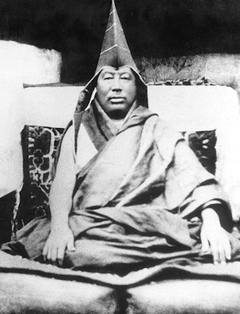Primordial Purity Free from Elaborations
Primordial Purity Free from Elaborations[1]
A Song of Experience
by Khenchen Ngawang Palzang
Namo guru!
Within space—primordially pure, free from elaborations, luminous, and limpid;
Within a smooth expanse of rainbow light, unaltered and uncultivated;
Oh, compassionate hero in whom afflictions are freed in pristine awareness,
I bow to the very expanse of our not meeting, which is itself the great meeting!
Listen, vajra brothers and sisters gathered here!
Our hero of the Great Perfection—magnificent, unaltered evenness;
The master of the assembly of ḍākinīs who gather without being summoned;
Our all-knowing guru, free in his body of rainbow light—[2]
Has journeyed to the spacious sky of coalescence free from elaborations.[3]
In the expanse of blissful dharmakāya, there is no meeting or parting;
Still, we long to see him, although it cannot be.
Vajra brothers and sisters gathered with me here, let us sing our sorrow.
Perhaps it will raise the withered white lilies of our spirits.
Vajra brothers and sisters who are inseparable from me, let’s dance!
For if we free dualistic appearances in ecstasy, we march far from expectations and anxieties.
Express the vision of your unfabricated experience freely
And we’ll reach the full expression of realization without clinging or limit!
If we play in dharmakāya whether it’s day or night,
The demonic hordes of dualistic perception will be ruined in shame.[4]
Just now, fruition is in full bloom and our souls[5] have found ease!
What a great wonder! How marvelous! Turn this over in your wise hearts!
Just now, sad songs ring pure in ecstasy!
In the expanse of the sphere of everything’s magnificent equalness,
The hero who has realized perfect equalness—the Great Perfection—is happy!
In mind, whose nature is ecstasy,
Multitudinous maladies arise as opportunities.
Fixating on them with likes and dislikes collapses in basic space![6]
Ultimately, in the expanse of the magnificent equalness of dharmatā,
For the yogi who meditates day and night,
The conventional words “birth” and “death” have no purchase.
Understanding this meaning is the grace of the guru, the lord of Dharma.
I offer the grace of gazing into my own true face!
These were the words of the guru, lord of Dharma.
| Translated by Joseph McClellan with editorial assistance from Nyinjed N.T., 2024.
Bibliography
Source Texts
mKhan po ngag dgaʼ. gSung ʼbum ngag dbang dpal bzang, vol. 2, pp. 31–32. Khreng tuʼu, n.d. BDRC W22946.
mKhan po ngag dgaʼ. gSung ʼbum kun mkhyen ngag gi dbang po, vol. 1, pp. 184–185. sNga ʼgyur kaḥ thog bcu phrag rig mdzod chen moʼi dpe tshogs. Khreng tuʼu: Si khron mi rigs dpe skrun khang, 2017. BDRC W4CZ364088.
Secondary Texts
Karma Phuntsho. Mipham’s Dialectics and the Debates on Emptiness. London: RoutledgeCurzon, 2005.
Namgyal, Tsetan. “Exploring the Linguistic Influence of Tibet in Ladakh (La-dwags).” Journal of Research Institute: Historical Development of the Tibetan Languages. Vol 49 (2013): 115–147.
Version: 1.0-20240417
-
The 2017 Chengdu edition classifies the piece as a "song of experience" (nyams mgur), whereas the older, undated edition gives it the genre classification of "counsel" (gdams pa), and it is contained in the general section of Khenpo Ngaga's works containing his "counsels." The title, which dervies from the first four syllables of the song, sets two profound terms together, and their combination can be understood in several ways. The first term is ka dag—as a noun, “primordial/original purity” or, as an adjective, “primordially/originally pure.” The second is spros bral, “freedom from conceptual elaborations” or “simplicity,” which can also be a predicate: “free from conceptual elaborations.” In the poem's first line, both are used as predicates for space. In the title's apposition, the first term is usually taken as principal, giving us “primordial purity [which is] free from elaborations.” It is completely admissible, however, to take the second term as principal giving us “primordially pure freedom from conceptual elaborations,” which would sound better shortened to “primordially pure simplicity. They might also be considered separate items in open apposition: primordially purity and freedom from conceptual elaborations. These meanings present themselves in Tibetan, though we believe the first reading is most common and the best choice for translating the title. ↩
-
In this section, Khenpo Ngaga is poetically referring to his master after he has passed away. The passing is conveyed with the participles “free” (grol) and “journeyed/departed” (gshegs). ↩
-
“Coalescence/unity” and “freedom from elaborations/simplicity” are terms found in many Tibetan compositions concerning “view.” They are poetic terms, but they are also technical, and here Khenpo Ngaga may have a specific technical sense in mind: In Mipham Rinpoche’s commentary to Śāntarakśita’s Madhyamakālaṃkāra, he discusses how a Middle Way meditator goes through four stages of insight into (1) emptiness, (2) coalescence [of the two truths], (3) freedom from elaborations, and (4) equality. For a study of this, see Karma Phuntsho, Mipham’s Dialectics and the Debates on Emptiness (p. 150) where the phrase in question appears in the following way: “An experience of lack of elaborations which is spontaneous and free from negation, affirmation, elimination, and delineation will arise. This is the experience of coalescence as free from elaborations [emphasis added] (zung ‘jug spros bral…).” ↩
-
The 2017 edition has the term kha skyengs su (“in shame”). The old edition reads kha skya. In his article “Exploring the Linguistic Influence of Tibet in Ladakh,” 137, Tsetan Namgyal glosses the unusual term kha skyang as confused/bewildered, which can also take the nominal form “confusion/bewilderment.” The phrase literally means “grey mouth” and the etymology remains a mystery. ↩
-
“Souls” here in the common poetic usage, as in the idiom “it soothes the soul.” It should not be understood in the metaphysical sense. The Tibetan term here is blo, which contains elements of “intelligence, attitude, mind-frame, ratiocination,” etc. It can roughly denote the personal mind with its attitudes and feelings. ↩
-
In the Tibetan for this line, 'dzin stong is amended to 'dzin stangs in the 2017 edition. ↩
